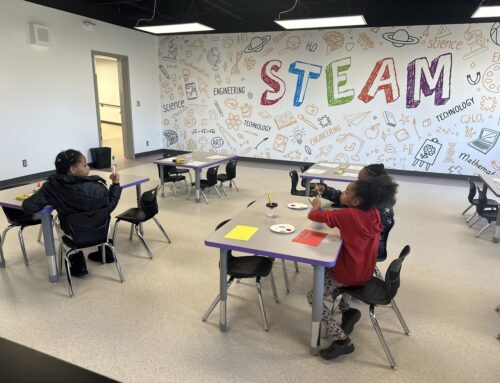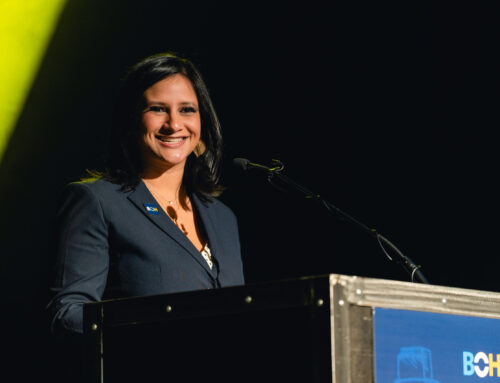Amid rising safety concerns, Dallas ISD boosts campus security while striving to meet armed guard mandate
After a tragic fatal shooting of a 17-year-old Kimball High School student earlier this month at a Kincaide Stadium football game, Dallas ISD increased safety protocols. Students are already required to bring student IDs to games, and carry any personal items in clear bags. The district canceled game-related events, and shifted the time and location of the long-standing “South Dallas Superbowl” rivalry game between the Legendary Lincoln and “The Great” James Madison high schools.
Earlier this month, Dr. L.G. Pinkston Sr. High School Principal Tameka Ward told parents at a Coffee with the Principal Event, that despite having two gyms at the school, she’s limiting the number of games played at the same time because she doesn’t feel like she has enough security on campus.
This call for increased security comes alongside Dallas ISD’s ongoing efforts to comply with House Bill 3, which requires an armed security officer on every campus.
Dallas ISD Police Chief Albert Martinez says the district hopes to meet the state’s expectations sometime within the next two years.
“We’re a little more than halfway there — maybe about 60% — but funding remains a challenge,” Martinez explains.

Martinez has been at Dallas ISD for about 8 months. He was previously the second in command at the Dallas Police Department, a role he and another assistant police chief shared, working directly with Dallas Chief Eddie Garcia.
The district budget for security is about $19 million a year, says Martinez. A police officer on average costs the district about $100 thousand a year, including salary, benefits and equipment.
Every middle and high school now has a Dallas ISD officer on campus, Martinez says. Elementary schools, however, have a “general security presence, but no assigned officers.”
Metal detectors at middle and high schools, but not for elementary students
Metal detectors are stationed at entrances in all middle and high schools, Martinez says. However, the district decided against metal detectors on elementary school campuses.
“We want a more welcoming environment at the elementary level,” Martinez says. “It’s not to say incidents can’t happen, but it’s rare to see a fourth-grader attempting to bring a weapon to school.”

At hybrid campuses where elementary and middle schools are combined, metal detectors are used at specified middle school student entrances. The principal may allow elementary students to use a separate entrance without screening.
Currently, sports bags and band equipment do not go through additional security at the entrance to the school, like clear backpacks do. According to Martinez, the responsibility for checking these items falls on coaches and band directors.
How principals decide to ‘secure’ versus ‘lockdown’ a campus
Lockdowns are triggered based on the nature of a threat. In the event of a lockdown — indicating a serious threat inside or outside the school — all classrooms and offices are locked, and students are instructed to stay out of sight, away from windows.
The decision to initiate a lockdown is made by the school’s principal. After the incident, the principal contacts the Dallas ISD communications team and prepares a letter to inform parents.
In less severe situations, a “secure” status may be implemented, where no one is allowed to enter or exit the building, but classes continue as usual inside.
There also have been discussions about limiting liquids brought into schools, but such decisions currently are made at the discretion of the principal.
Albert Martinez joined the Dallas ISD police department eight months ago. The Dallas ISD Board of Trustees approved the creation of an in-house police force to enhance safety for students and staff in March 2003. The Dallas ISD Police and Security Services Department now handles all law enforcement duties within the district.
Share This Story, Choose Your Platform!

Sujata Dand is an award-winning journalist who is energized by change brought in communities in response to news stories. She lives in and has spent most of her reporting career in Dallas, with ample experience covering health care, education and public policy.
“I think it’s important to elevate voices that are often ignored,” Dand says. “For me, that means meeting the people in our communities. We need to see people and listen to them. It’s often a huge act of courage for people to openly share their lives. So, I feel an enormous responsibility in making sure my stories are authentic and fair.”
Dand worked at KERA for almost 10 years, where she produced several television documentaries, including “Life in the Balance: The Health Care Crisis in Texas” and “High School: The Best and the Rest.” She also headed the multimedia project “Boyfriends,” which examined the complex personal and cultural factors that contribute to the way adolescent girls form and maintain relationships. Her work has garnered several local Emmys and national awards including a Gracie for best reality program.
Prior to her work with KERA, Sujata was a reporter and anchor at the CBS affiliate in Wichita Falls, Texas. She has worked as a freelance reporter for NPR and Dallas Morning News. Dand is a graduate of Trinity University in San Antonio.
Areas of Expertise:
health care, education, public policy
Location Expertise:
Dallas, Texas
Official Title:
Senior Editor and Reporter
Email Address:
sujata@dallasfreepress.com





